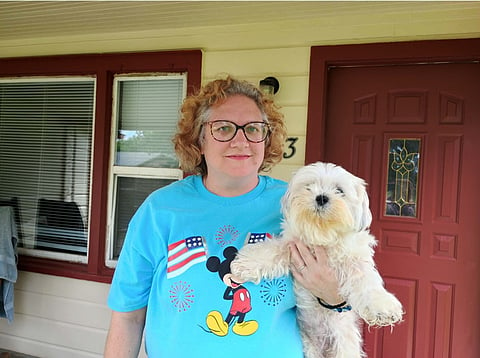
- Home
- Topic Areas
- Newsletter
- Podcast
- 100 Families Initiative
- About
- Connect
- Restore Hope

The Waring family was exhausted by crisis. Travis Waring was a father battling alcoholism. He chose recovery and entered treatment in Florida while his wife, Kim, kept life steady for their children at home. The separation was painful, but it opened the door to a new way of life. After reconciling, the family reunited in Florida and began rebuilding—until an on-the-job injury left Travis without work and the family’s fragile stability quickly unraveled.
Hoping to regain footing, the Warings planned a move to Arkansas with help from relatives. They sent their remaining savings ahead to secure housing, only to arrive and learn the money was gone. They moved in with extended family, and soon after, another blow: their young daughter was harmed in the home. In the immediate aftermath, First Presbyterian Church covered a short motel stay until Community Rescue Mission (CRM) had a room available. The Hamilton Center stepped in alongside them, providing services for their daughter and bringing food to the motel so the family could focus on safety and next steps.
Homeless, traumatized, and out of options, the Warings connected with the 100 Families Initiative and were paired with Family Advocate Erica Valle, who immediately began coordinating a community response.
Erica introduced the Warings to CRM—a long-standing partner in regional efforts to stabilize families. Together with Patricia at CRM and Jeanne Carroll with Fort Smith Public Schools, a care team surrounded the family with practical support: safe temporary housing, school enrollment and stability for the children, and a plan to rebuild savings. For the Warings, the coordinated response felt like a lifeline—timely, compassionate, and focused on the whole family.
While the family worked to re-establish income and routine, the care team helped them move from short-term safety to long-term stability. The Warings received a housing voucher, and Erica and Patricia navigated the details to secure a rental home. Through the HomeARP program administered by Restore Hope, the team also helped cover move-in costs and essentials. Partners from the Arkansas Family Alliance stepped in with household items to ensure the Warings could begin their new chapter with dignity and the basics in place.
This is the 100 Families model at work: a community-led approach that brings together public schools, nonprofit partners, faith communities, housing resources, and family advocacy to move families from crisis to stability and onward to thriving careers. In this case, First Presbyterian Church provided emergency lodging; the Hamilton Center supported the child’s needs and delivered meals; CRM offered safe housing and the structure to save; Fort Smith Public Schools ensured educational continuity; Restore Hope and HomeARP bridged critical financial gaps; and the Arkansas Family Alliance supplied essentials. Throughout, the Family Advocate coordinated information, reduced duplication, and kept the plan focused on clear, achievable goals.
Today, the Warings are housed and rebuilding. They are budgeting, saving, and staying connected to their support network. Most importantly, the children have stability and the family is together in a safe environment. The care team continues to check in, offering encouragement, accountability, and help navigating next steps—employment, ongoing recovery support, and community connections.
The Waring family’s story reflects both the vulnerability of families in crisis and the power of a coordinated community response. Recovery, safe housing, school stability, practical assistance, and immediate faith- and community-based support were aligned through relationships and shared responsibility. What could have been another cycle of homelessness and instability became a bridge to a sustainable future—because partners worked together, quickly and with purpose.
Smart Justice is a magazine, podcast, and continuing news coverage from the nonprofit Restore Hope and covers the pursuit of better outcomes on justice system-related issues, such as child welfare, incarceration, and juvenile justice. Our coverage is solutions-oriented, focusing on the innovative ways in which communities are solving issues and the lessons that have been learned as a result of successes and challenges.
The podcast is available on all major podcasting platforms.
Subscribe to the Smart Justice newsletter.
